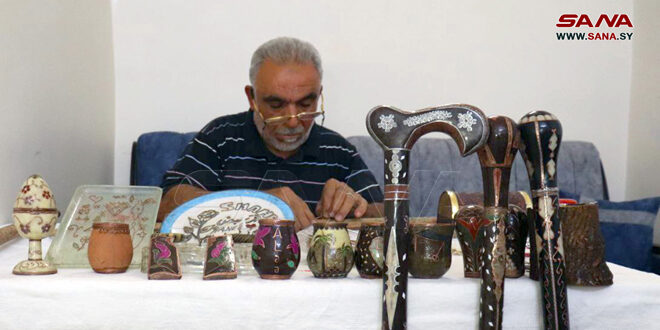Abdul Qader Hantayeh, known as Abustaif, is considered one of the prominent names in the world of traditional crafts that has succeeded in preserving the arabesque profession in the city of Aleppo, a profession that relies on wood and copper, and was previously used to make home furniture such as chairs and tables.
Despite the time and effort it requires as it is a completely manual profession, Hintayeh was able to present the profession of Arabesque with a new spirit that is in line with the requirements of the era, as he explained in an interview that the cost of producing traditional arabesque pieces has become high, which prompted him to develop the profession to be within everyone’s reach, so he introduced arabesque in a new way, as he began making mate cups and holders of different sizes, in addition to crutches, medals and even accessories, which gave this craft a new dimension, indicating that he uses natural plant colors to color his products, such as coffee and date pits, as he converts the date pits into powder to use in coloring or shape them into shells.
Natural shells are also used after being broken or carved to add an artistic touch to the pieces. Hintayaeh explained that this craft requires patience and precision in showing the details, in addition to great effort because Arabesque depends entirely on manual work, starting from wrapping the copper to extracting the colors, gluing and hammering the pieces. Creativity and artistic taste also play a major role in obtaining elaborate and artistic pieces at the same time.
Regarding the drawings he uses, Hintayeh explains that they vary between geometric, botanical, and animal, and the tools needed to implement his work are wood, red copper wire, and colors. He draws the shape on the piece, then sticks the copper wire using pliers and nail clippers, and then colors the spaces. For example, the date pulp can turn into a color similar to marble after carving.
Hintayeh also talked about how he learned this craft from the master of the profession who initially tried to monopolize the secrets of the profession, but thanks to Hintayeh’s great love for arabesque, he began to closely monitor him and learned from him step by step until he was finally able to discover the secrets of the profession and master it.
Hintayeh concluded his talk with a message to the youth, inviting them to use their free time to learn a craft or profession they love, stressing that professions, despite their difficulties, hold great value in preserving the intangible Syrian cultural heritage.

